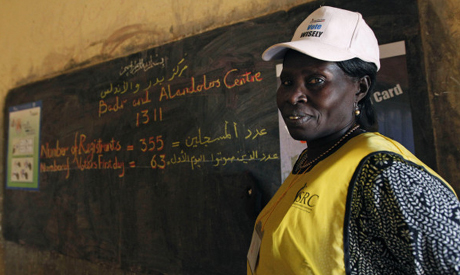
A polling staff member stands by a board showing the polling centre's output numbers during the second day of the referendum in the suburb of Mandela at the outskirts of the capital Khartoum, Monday, 10 Jan. 2011. (AP)
Voters in Juba turned out in high numbers, lining up hours ahead of the start of the referendum set for 8 AM Sunday. According to the Sudan People’s Liberation Movement (SPLM), 90 per cent of the 4 million registered voters are expected to cast their vote.
Voters were submitted to rigorous searches at the doors of the polling stations, which were monitored by hundreds of local, Arab, and foreign observers. General security was also tight, as army units patrolled the southern states. Meanwhile, the authorities in Juba closed streets to traffic and shops were ordered to shut down in order to minimise possible acts of violence.
The southern Sudanese government has issued decrees so as to ensure the government continues to function smoothly.
Salva Kiir, president of the southern government, cast his vote at a polling station attached to the mausoleum of former leader John Garang in the outskirts of Juba. Emerging from the station shortly after 8 AM, Kiir waved to the masses, a gesture expressing that south Sudan was saying goodbye to the north. He then spoke briefly to reporters, saying that the referendum meant that the hundreds of southerners who gave their life for independence had not died in vain.
Kiir called on the voters to be patient, behave orderly, and allow the balloting to proceed smoothly. He said that northerners living in the south have nothing to fear, urging the population in the north to respect the rights and property of the southerners living in the north. Kiir also recalled the sacrifices made by Garang and other SPLM leaders, saying that, on this day, they were present in the spirit.
The final results of the weeklong referendum will be announced on 14 February.
Speaking to Al-Ahram, Shan Reig Madut, vice chairman of the South Sudan Referendum Commission (SSRC), voiced satisfaction over the course of the voting, and noted that the referendum was proceeding smoothly in Juba and other parts of the south. According to Madut, the south will remain a part of Sudan until 9 July, after which the new state will be announced.
The defence minister of the south government, Nhial Deng Nhial, said that the referendum day crowned a twenty-year struggle by the people of south Sudan. He, too, voiced satisfaction over the orderly way in which the referendum was being conducted and dismissed any claims of irregularity. He noted that the presence of international, regional, and local observers was a further guarantee that the referendum was fair and free. No violence has been reported so far in areas where the referendum has been held.
South Investment Minister Oyay Deng Ajak voiced hopes that the referendum would mark the end of suffering for the southerners. The SPLM, he added, has struggled long for the empowerment of the southerners.
South Information Minister Baranaba Benjamin said that the southerners wanted the secession to proceed in an orderly manner. He told Al-Ahram that the new state would not isolate itself from its Arab neighbours and would have close relations with the north. This, he said, was what Salva Kiir told President Mubarak when the latter visited Juba last year.
Benjamin said that the southerners were eager to build a new state that benefits from the immense natural resources of the country, accelerate development, and end nearly 100 years of suffering.
The south chose secession after all attempts to maintain unity failed due to the lack of development and the continued disturbances in the country, Benjamin stated. Since 2005, when the SPLM took over in the south, the movement has built infrastructure, opened schools and generally boosted the standards of living for the population.
The information minister said that his ministry planned to build radio stations and television networks, and would encourage the publication of newspapers in order to promote the freedom of expression, adding that south Sudan has no shortage of media professionals who have been trained with Egypt’s help.
Limited clashed took place between the Dinka and Messiria tribes in the disputed region of Abyei on Saturday night. The streets in Abyei were reportedly empty on Saturday night, perhaps because most of the population stayed home to watch the outcome of the referendum. Abyei has not yet been included in the referendum.
The SPLM held a press conference in Abyei in which it said it supported any decision taken by the southerners. The SPLM also voiced hope for an early solution to the dispute over Abyei.
Short link: